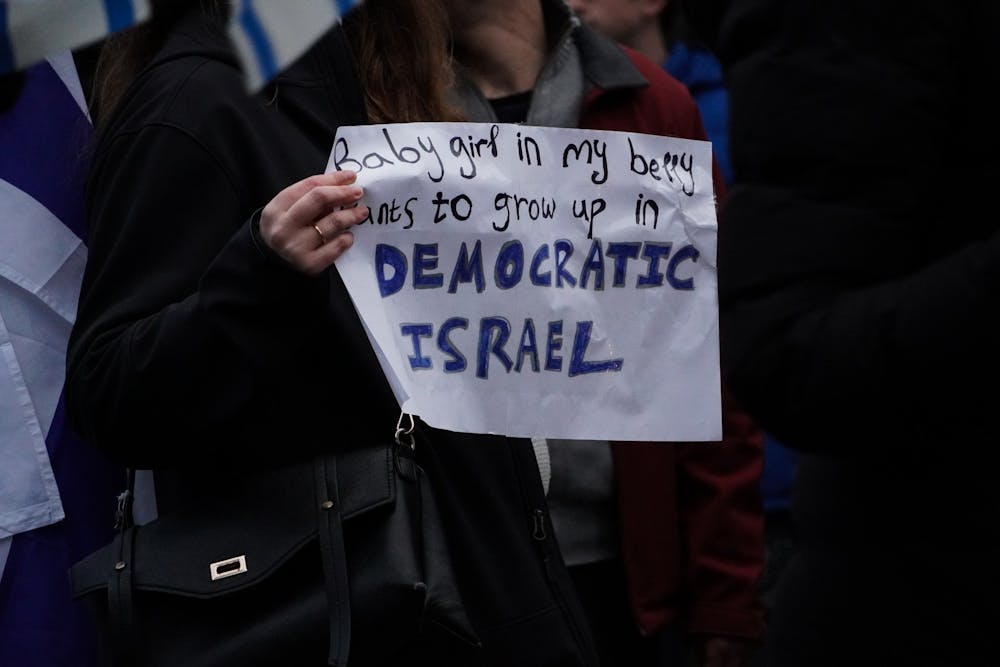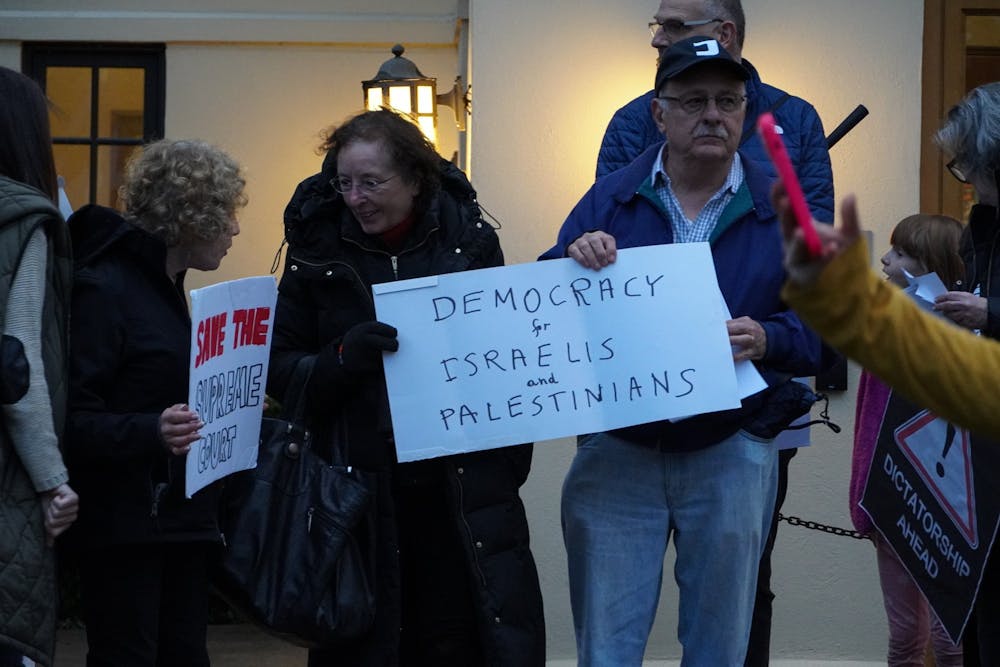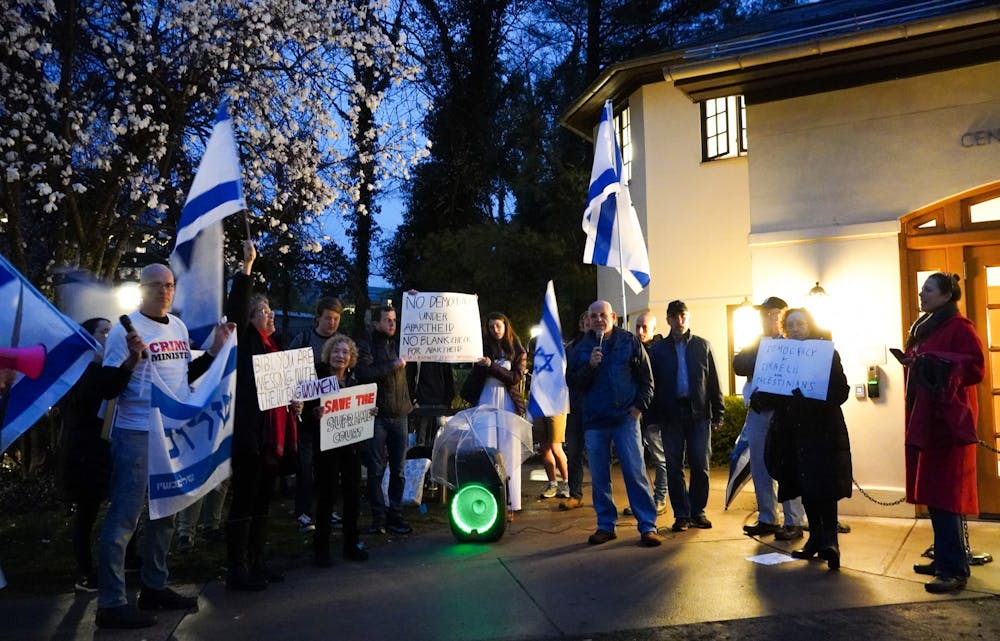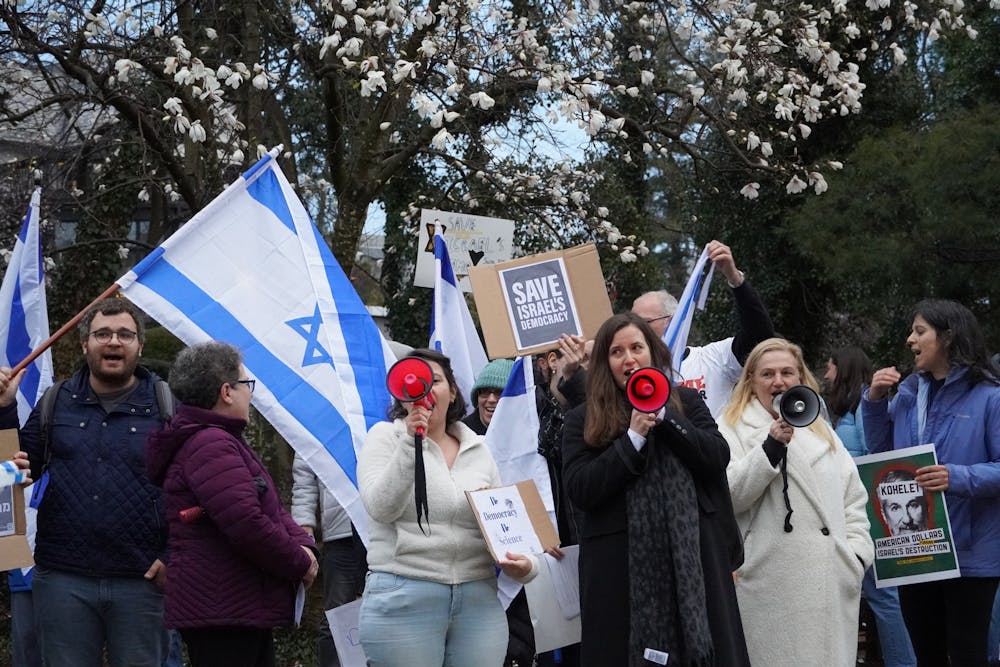“Needless to say, democracy: in Hebrew, we say ‘democratia,’” history professor Yair Mintzker said in his speech to protestors gathered in front of the Center for Jewish Life (CJL) on Monday, March 27. Over 70 protestors were present, voicing their opposition to a talk at the CJL given by Ronen Shoval, a visiting fellow at the James Madison Program, that evening.
‘Democratia,’ the Hebrew word for democracy, was frequently chanted by the protestors who viewed Shoval’s support of the proposed Israeli judicial reforms as attacks on democracy. Shoval has been tied to groups criticized for their far-right positions and an open letter currently circulating calls on the University to distance itself from Shoval.
Over the past several days in Israel, hospitals, planes, malls, and banks have been shut down as a wave of Israeli citizens took to the streets to protest the judicial reforms put forth by Prime Minister Benjamin Netanyahu. These reforms would mean that representatives and appointees of Netanyahu’s right-wing government would have an automatic majority on the committee that chooses judges — essentially placing the choice of judges in the hands of the government.
While around 15 students were present at the protest, the majority of demonstrators were adults from the Princeton area and beyond, including many Israelis. In an email to The Daily Princetonian, Mintzker noted that some came “from as far as New York City.”
Shoval was invited to speak as part of a two-part series on Israeli judicial reform hosted by the CJL. David Halperin, CEO of Israel Policy Forum, spoke on March 23 in opposition to reforms.
According to a student who attended both events, the Halperin event had a much more casual atmosphere and was attended by fewer than 20 people, whereas upwards of 50 came to hear Shoval speak.
After giving a speech at the protest, President of the Alliance for Jewish Progressives Emanuelle Sippy ’25 told the ‘Prince,’ “We are here tonight to say that there’s no democracy possible under apartheid; to say that Ronen Shoval, who’s speaking at the Center for Jewish Life, and the organizations that he is affiliated with, like the Tikvah Fund, like the Kohelet Foundation are deeply problematic and their fascism, their racism, is not in our name. They do not speak for all Jews.”
Shoval is a lecturer in the University’s politics department and the founder of Im Tirtzu, a non-governmental organization that several protestors described as “ultra-nationalist.” Shoval left Im Tirtzu in 2013. According to his LinkedIn, he is also Dean of the Tikvah Fund, a Jewish think tank that self-identifies as “politically Zionist, economically free-market oriented, culturally traditional, and theologically open-minded.”

The Tikvah Fund also ran a university center — the Tikvah Project on Jewish Thought at Princeton — in the past. The program ended in 2014.
Protestors gathered outside the CJL at 7:00 p.m., half an hour before Shoval’s presentation began. Many carried Israeli flags, horns, and posters with slogans such as “Democracy for Israelis and Palestinians,” “Save the Supreme Court,” and “Baby girl in my belly wants to grow up in democratic Israel.” The protest was organized by Mintzker and Rica Levy, a resident of the Princeton community.

Louisa Gheorghita / The Daily Princetonian

In an interview with the ‘Prince,’ Levy called Shoval “a racist,” stating, “He’s part of a think tank that’s behind all of the changes that the government wants to make in Israel.” She shared that “the goal of today’s protest, specifically, is to let the person who’s speaking here today understand that many people are opposed to what he is saying.”
When asked about the accusations of fascism and racism in an interview with the ‘Prince,’ Shoval responded, “I hate fascism. I see fascism as dangerous for the world. And I disagree completely with the message of fascism with all my heart.”
“I think that when people are making these kinds of accusations, it is when they don’t want to deal with the other person’s perspective, and it’s much easier to put a label on them,” he continued.
Attitudes regarding the controversial event have continued to evolve on campus. J Street, an organization that, according to their website, “organizes pro-Israel, pro-peace, pro-democracy Americans to promote US policies that embody our deeply held Jewish and democratic values,” initially sponsored the Shoval event and was listed as such on the promotional flyer.
However, according to Joaquin Bierman ’25, president of J Street U Princeton, the group decided to pull their sponsorship of the event “after looking into the right-wing speaker … more closely. We do not support what he stands for in the least.”
The CJL did not condemn the protest, despite sponsoring the event. Before the event began, Executive Director of the CJL Rabbi Gil Steinlauf ’91 addressed protestors outside, stating, “We want you to know that we welcome you here, that we are happy that you are here. We are happy that you are supporting democracy in Israel. CJL supports all of the Jewish people.”
“We know that this is a very painful time for all the Jewish people,” he added. “We know that we are having a speaker tonight who is difficult for many people.”
In a post-event interview, Steinlauf stated, “we here at the CJL in no way are here to advocate for the views that were presented” by Shoval.
After Steinlauf addressed the crowd, Mintzker then took the front of the crowd, presenting a speech to protestors. During moments of pause, protestors alternated between shouting in Hebrew and booing Shoval.
Mintzker described Shoval’s past actions and support of the Israeli judicial reforms as “proto-fascist.” He drew attention to Shoval’s role as a lecturer at Princeton, calling for students to be able to remove themselves from his first-year seminar, FRS184: Virtues and the Meaning of Life in Different Cultures.
A number of other speakers addressed the crowd, including Sippy, who expressed her disappointment in the CJL’s decision to invite Shoval as a speaker.
“[We’d] like to push the Center for Jewish Life, its staff, and this entire university to recognize that if they claim to care about Jewish students, they actually cannot continue to support right-wing fascist propaganda,” she said.
Inside the CJL, Jewish Agency Israel Fellow Eitan Teiger moderated the talk.
“The purpose of this series is to educate our students and community and to engage in meaningful conversations and productive debate,” Teiger stated at the beginning of the event.
Once the talk had ended, Teiger provided commentary regarding the CJL’s decision to host Shoval.
“It’s important for me and for us at the CJL to have the ability to have these hard conversations,” he stated. “Although we had some difficulties here, we can tolerate it, including the fact that there was a demonstration outside. I think this is an example for dialogue or conversation when it’s hard.”
In an interview after the talk, Steinlauf elaborated on how Shoval had been chosen to speak.
“Our Israel fellow [Teiger] invited these two speakers knowing that they would represent very sharp contrasts,” he said. According to Steinlauf, they were invited with the approval of a special committee, composed of Princeton faculty, members of the CJL Board of Directors, and students, who “represent a broad array of political perspectives on Israel.”
“The understanding was, of course, that this would be deeply controversial.”
Shoval’s presentation at the CJL comes after campus controversy over the English department’s Edward W. Said ’57 Memorial Lecture with Palestinian writer Mohammed El-Kurd, who has been accused of antisemitism. A letter signed by members of the Princeton community, delivered to the English department, called on them to denounce the speaker.
Steinlauf stressed that the CJL’s event was different in nature to that of the El-Kurd lecture.
“I think that the reason why we were deeply concerned about Mohammed El-Kurd speaking, is because he engaged in speech that was directly inciting, that invoked classic antisemitic tropes,” Steinlauf said in an interview with the ‘Prince.’
“This is a completely different kind of situation in that this is a deep divide within the Jewish community. It’s a divide between two vehemently opposed views of what the Jewish state can be or ought to be, and very, very different views of what constitutes liberalism and what is illiberal in the Jewish state.”
Not all students agree.
“It is one thing to invite Shoval on the grounds of the University’s free speech policies, and it is another for the Center for Jewish Life to pretend that this invitation falls in line with their own policies, in which they claim that the organization will not ‘promote racism or hatred of any kind,’” Sippy wrote in an email to the ‘Prince.’ “Shoval promotes racism and hatred; the only question is whether the CJL is blind to this fact or blatantly disregards its own policies — in favor of the right.”
Shoval’s address and the protest were also not entirely removed from the broader debate around Israel and Palestine.
During the Q&A portion of the event, one student attendee asked Shoval to address Israel’s “military occupation” of Palestine and the nonvoting status of most Palestinians in Israel’s elections, referencing Israeli officials’ denial of the existence of a Palestinian people and the burning of Palestinian villages.
Shoval opposed the premise of the question, stating that though Palestinians cannot vote in Israeli elections, they have their own government with the potential for democratic elections.
Some protestors outside also held signs in support of Palestine.
Palestinians in the West Bank and Gaza are ineligible to vote in Israeli elections, while those living in East Jerusalem are only eligible if they have obtained an Israeli citizenship — a move that would forfeit their right to vote in Palestinian elections. The Palestinian Authority (PA), the legal governing body in the West Bank and Gaza, held its first municipal elections since 2006 in 2021, though PA president Mahmoud Abbas’s term ended in 2009 and he has not been formally re-elected since.

A protestor holds a sign in support of democracy in both Israel and Palestine.
Louisa Gheorghita / The Daily Princetonian
Before and during Shoval’s address, protestors outside continued to chant in Hebrew, “He’s a fascist,” “Shame,” and “Democracy.” At times, they sang the Israeli national anthem and used horns and whistles to emphasize their point.
About ten minutes into the talk, a microphone was brought into the CJL for Shoval so he could be heard over the protestors.
Free Expression Coordinators from the Office of the Dean of Undergraduate Students (ODUS) came outside to speak with Professor Mintzker multiple times regarding the noise being made, as the protestors could be heard from inside the CJL. In response to the “amplified noise” complaint, protestors lessened their use of the whistles and horns but continued to chant and shout.
According to the ODUS website, “Activities that take place in the vicinity of University residences, classrooms, the library, the chapel, and similar facilities must be conducted in such a way as to respect the necessity for maintaining a reasonable degree of quiet in such areas.”
University Spokesperson Michael Hotchkiss wrote to the ‘Prince,’ “At Monday’s protest outside CJL, asking the protestors to stop using battery-powered sound devices was sufficient to allow the event inside to continue without disruption while protestors continued to be able to express their views outside.”

Louisa Gheorghita / The Daily Princetonian
Inside, Shoval continued his talk, with various interruptions from audience members attempting to dispute his claims. As Shoval spoke, the flag of Israel repeatedly fell off the wall, much to the audience’s amusement.
At one point, Shoval compared the judicial reform protests in Israel to the Jan. 6, 2021 Capitol riot in the United States.
Referring to the riot, Shoval said, “What you see in Israel is exactly the same.” He said that Israeli protestors are part of a political minority “trying to overrule the decision of the majority.” In response, an audience member interrupted, but Teiger intervened, stating that there would be time for questions at the end.
Later, during the Q&A period, one student pushed back against Shoval’s comparison, stating that it was “Not accurate at all.” The student’s criticism was met with applause from the audience, but Shoval doubled down, stating, “As much as it’s uncomfortable to see it, this is exactly a mirror.”
In a later interview with the ‘Prince,’ Shoval characterized both situations as one where “the side [who] is losing the election doesn’t accept the outcome of the election and uses violence in order to promote their ideas.”
In an interview following the event, CJL Student President Julie Levey ’24 stated, “I’m very proud of my peers at the CJL for showing up not just tonight, but also at the first part of this two-part event and asking critical, analytical, well-articulated, and deeply thought-out questions.”
Throughout the rest of Shoval’s speech, several students and community members tried to interrupt and dispute his claims, and on multiple occasions, audience members and Shoval raised their voices, sometimes in Hebrew. Those gathered inside the CJL at times disagreed, and additional back-and-forths broke out between those opposed to Shoval’s speech and those in support.
Janny Eng is a staff News writer for the ‘Prince.’
Annie Rupertus is an associate News editor for the ‘Prince.’
Please direct any corrections requests to corrections[at]dailyprincetonian.com.
Editor’s note: This piece has been updated to clarify the order of speakers at the protest and the sequence of the conflict that played out during the talk.








